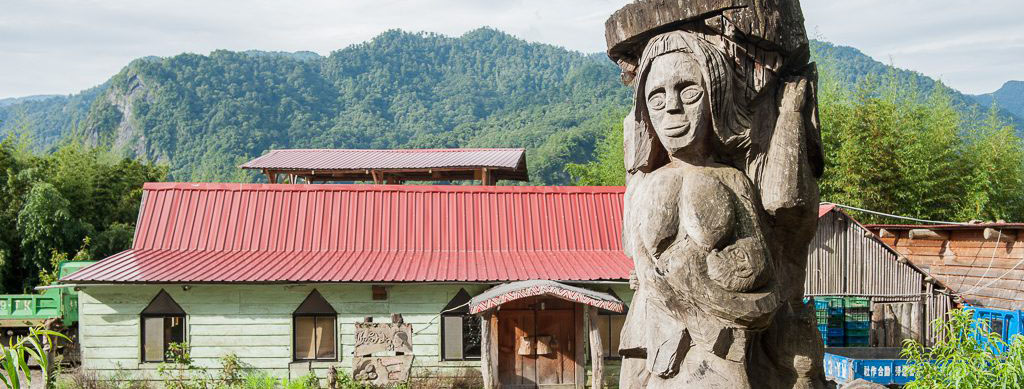
3D/2N: Hsinchu Mountain and Atayal Culture
This tour is all about discover local and off the beaten path, in some cases located in remote area.
It's not a tour for everybody; therefore please read carefully:
► Some of the accommodations are local, simple and basic B&B. If you are expecting hotels with facilities, this tour is not for you. There are not many hotels located in indigenous and rural areas. In these areas, accommodation will mostly be in family-run guesthouses. In other areas, we can provide also 4* and 5* hotels on request (Taroko, Alishan, Sun Moon Lake).
► These tours are not synonyms of "cheap"; the price we are proposing involves many efforts to be made in advance, during and after your trip.
►You will need to bring along enough New Taiwan Dollar (NT$) in cash, as credit cards are rarely accepted and there are very few ATMs or banks.
► Basic medical care and first aid is usually available but there is rarely a pharmacy. So, bring along an ample supply of all necessary prescription and over-the-counter medication.
► Familiar food can be difficult to find and very local food can be sometimes served, please be ready to accept different/unknown flavors and if you need to refuse, be polite while doing it.
► Taking photos is not a problem in most of the cases, but respect their privacy.
► Taiwan's indigenous tribes have had contact with the outside world and mainstream society for a long time. Even in their villages, they mostly live in modern houses and dress in modern clothing.
► Itineraries are subject to change due to weather or road conditions and availability.
About Atayal tribe
The Atayal has the largest distribution of Taiwan’s indigenous tribes stretching from the north to the center to the east. The males of the Atayal tribe have long been respected for their hunting and trapping skills and their harmonious relationship with nature. For example, hunting is never carried out during the breeding season to ensure that animal populations are not reduced. Modern life has come with its conveniences such as obtaining food more easily and with laws restricting the hunting activities of the indigenous people. To avoid losing their hunting traditions, many Atayal villages are working to revive hunting practices. The Atayal have developed many types of traps and snares from large to small, depending on the type of animal to be caught. Cloth weaving is an important traditional art form among the Atayal. From long ago, to the present, the women of the Atayal tribe have been considered some of the best weavers. This is due to the complexity of the patterns produced using manual looms. Traditionally, a simple horizontal backstrap loom was used. A woman sat on the ground and placed a strap around her back using her waist to adjust the tension. She stretched out her legs over which was placed the weaving frame. This was attached to a hollow wooden stand which could serve as a place to store weaving materials or as a percussion instrument. Facial tattooing was a tradition of the Atayal, Sediq and Truku tribes. Among males, tattoos were comprised of a thick, vertical line down the center of the forehead and another vertical line down the center of the chin. Among females, the tattoos were more complicated with a vertical line down the center of the forehead and a complex pattern around the mouth and across both cheeks. A complete set of facial tattoos was considered a symbol of entry into adulthood, as well as a symbol of accomplishment. The males of the tribe had to prove themselves to be skilled warriors, able to protect their family, and the females had to prove themselves to be skilled weavers, able to clothe their family. This tradition began to be banned in 1913 by the Japanese who occupied Taiwan at the time. This ban resulted in much resistance by the Atayal, Sediq and Truku tribes but was successfully enforced by the end of the 1930s. Now, only a handful of very elderly women have these tattoos. To keep this important part of the culture from completely dying out, in the recent decade several young people from these tribes have made a brave decision to tattoo their faces.

Itinerary
注意事項 Notes
This trip is proposed as an example and can be modified upon client's expectations and requests.
To receive a quotation please send us the following information:
1) Date:
2) How many persons (adults, kids and infants):
Interested in this tour or need more information?
Email:
✉ anna@northwest.com.tw
✉ taiwan.tour@northwest.com.tw
We will contact you within 48 hours (Monday to Friday).
This tour is made in collaboration with Tribe Asia.
About Tribe Asia:
Tribe-Asia, working in partnership with responsible tour operators and indigenous villages and communities, is also developing exciting travel itineraries into Taiwan’s indigenous communities. These tours focus on the ecology and culture of these areas. It is also beginning to expand travel itinerary themes to bring attention to Taiwan's incredible diversity and hospitality.
Discover more on https://tribe-asia.com
Texts and pictures belong to Tribe Asia.
About Northwest:
Founded in 1986, Northwest is one of the major travel agencies in Taiwan. With its 30 years of experience and 2 offices in Taiwan, Northwest offers a professional and multilingual service to satisfy all the needs of our clients.Our network of specialists guarantee you to enjoy the incredible sense of hospitality that the island of Taiwan has to offer with a broad range of budgets.



